Free Keywords Research for Bloggers and Affiliates

If you can’t afford the pricey keyword research tools on the market read this post to the end.
I am going to show you a method to find keywords that help you rank your blog post on page one on google even if you have a brand new website without spending a cent.
I assume you already selected your niche and you have an idea of what products you are going to promote on your website. If this is the case let’s get started with keyword research:
If you like to see this content in video format, click here.
What Is A Keyword?
A keyword is a word or a phrase that is typed by someone on a search engine, for example, google search bar’ to find information on a specific topic.


STEP 1: Generate Keywords Ideas
The first step is to collect some keywords ideas. If you have a niche you know the seed keyword or keywords. Seed keywords broad keywords related to the niche. For example:
‘Affiliate Marketing’ or ‘Affiliate Marketing for Beginners’
There are many free tools and free plans on paid tools that allow you to find a long list of keywords in your niche.
If we run these seed words on ‘Answer the Public’, it can give us plenty of keyword ideas. Then we start to collect keywords that seem relevant.
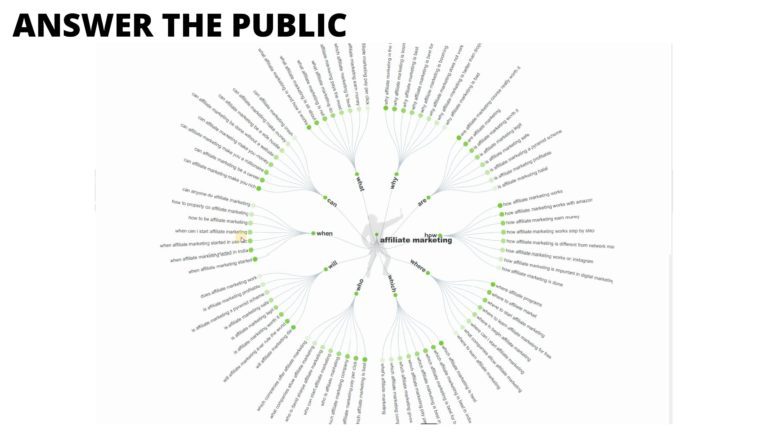

I searched affiliate marketing keywords on Wordtracker too and started adding keywords to my first list. Check the google sheet below.
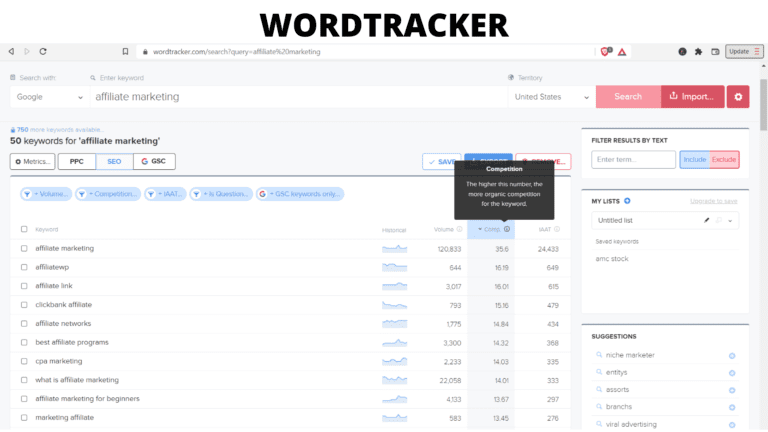

Plus, you can search on Google search bar. Go down to related searches. Gather as many keywords as you can.
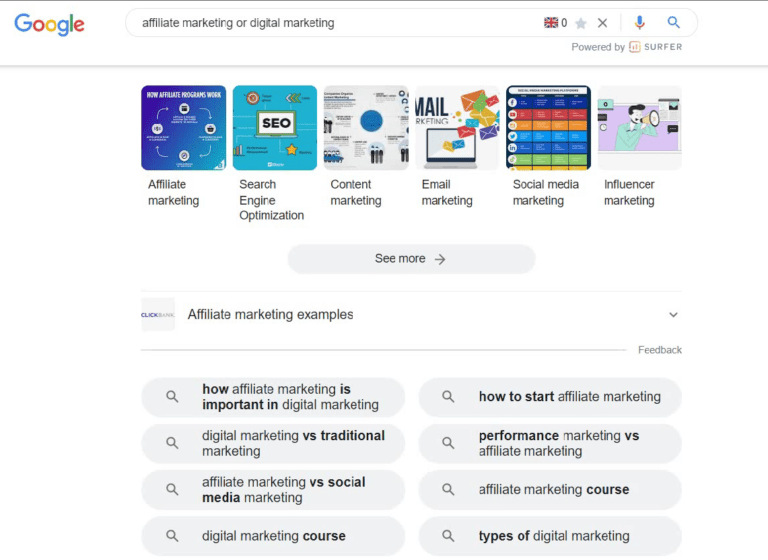

Here I used Answer the Public, Wordtracker and Google to collect keywords in my list. Here is a list of other free tools or free trials on paid tools you can use to generate your keyword ideas:
Infinite Suggest
Moz free tool
Spyfu
SemRush free trial
Note that these tools will limit your search to 3-4 free searches then will ask you to pay for a subscription. But, it is good to get your first list.
See below the list I collected from the combination of Answer The Public and Wordtracker.
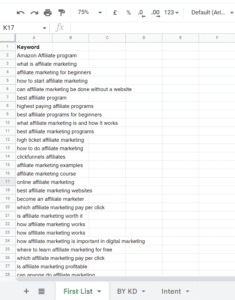

You can see if you use ahrefs free keyword generator you get a similar list of 100 keywords. Now, we have a list to work with, let’s narrow it down.


STEP 2: Narrow them down by keyword difficulty (KD)
Keyword difficulty refers to as KD on many tools, is simply how easy it is to break through the competition and rank your blog post on top searches in google. That is usually when paid tools are needed. But, we can tell how a keyword is competitive to rank using Wordtracker.
You see here where it says comp if come to the I, it says ‘the higher this number the more competition’ they specify ‘organic competition unlike we see on keyword planner here the competition here is for people who want to advertise for that specific keyword.
A TIP: You can tell how competitive a keyword is without the need for any tools.
Check google SERP if the top websites are q and websites, forums, videos, and low authority websites you know you can rank for that keyword. The articles are 1000 words or less, you know you can compete and rank for that keyword.
But if you see .gov, or well-known companies’ websites, is an indication the word is too competitive and you don’t stand a chance to rank for that keyword.
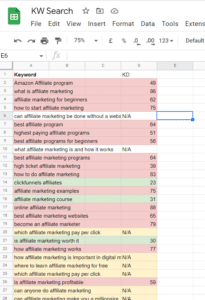

The screenshot shows a narrowed down keyword list by keyword difficulty.
You can use the free Ahrefs keyword difficulty checker to see how difficult it is to rank for a keyword. Let’s see the same keyword we have checked on Wordtracker to see how accurate it is. So, you can enter your keywords from your list one by one on Wordtracker or Ahrefs kw difficulty checker to determine how competitive it is. On Ahrefs you should go for keyword difficulty below 30.
Here, I have narrowed down my list by keyword difficulty.
It is a lengthy process but if you want to do it for free that is the cost. If you pay for Ahrefs you get the KD in a click of a button but here we have to find the KD for each keyword.


STEP 3: Understand Search Volume
Search volume is the number of searches for a specific keyword. Usually the higher search volume for keywords the more competitive they are. So, it is common advice to go after high volume keywords. Some say if it is less than 1000 searches per month they are not worth it. But, these tools are more accurate for huge websites that have tons of traffic so there is enough data to show somewhat accurate SV. But for medium to small websites the search volume is always much lower than what it actually is.
Income school proved that the best and well known tools underestimate the keyword search volume. To decide whether to go for a keyword or not is to use common sense. Search on google and see what comes up on SERP and based on what you find you can determine if a kw is worth targeting.
So, for a new website with little or no traffic we have to go with low volume keywords. That is 500 and below. This number may seem too low, but that is okay to get initial traffic to your website.
STEP 4: Classify Keywords By Search Intent
There are different types of search intent. The user may want to find information to learn, to gather some information, to compare prices, or to buy a product. Hence, these search types:
Informational, Navigational, Commercial Investigation and Transactional
For the ‘affiliate marketing’ example:
Informational would be: How to Start Affiliate Marketing?
Navigational would be: Driving Traffic Strategies For Affiliate Marketing Website
Commercial investigation would be: Best Sales Funnel Software For Ecommerce
and transactional would be: Clickfunnels Price Plans
You may think transactional is the only intent to focus on as it brings sales. But, it is not easy to get people to buy from you if they don’t know you or you only direct them to products and services to buy.
So you should aim to add all types of search intent to your blog as it is easier to convert a portion of your website visitors and they become your customers. If you give them information, next time they will navigate your blog post they are more likely to buy your products or from your links if you do affiliate marketing.
So, the idea is to give value and if you help people and to build some trust before they consider clicking on your links.
STEP 5: Add Products/Services To Your Blog Post
When you choose a keyword to write your blog post or article about. You should ask yourself if you will be able to add products naturally in the post? Without giving an impression to push them to buy your products or from your affiliate links. Sprinkling some products or services all over your article randomly, won’t serve you as an affiliate. So, choose the keywords placement wisely.
STEP 6: Check the SERP
Finally, you have to check “Search engine results page” (SERP) to see the content format. If most results are videos, you should consider making a video too. The same if they are blogs, landing pages or product pages.
Analyse titles of ranking pages to know the search intent and obviously you should aim to match the intent of the top ranked articles.
You should assess how hard it is to rank for your keyword. Use Ahrefs website authority checker.
Final Thoughts!
This is the simple way to start with keyword research for free. You can start by implementing other people’s keyword search strategies (like this one here) but you should find your own way to do things differently to stand out. If everybody does what is taught and everybody goes for the same keywords in the same niche it will lead to high competition.


